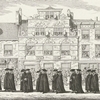Snak, Claas and Bastiaan’s Struggle for Freedom
Three Curaçaoan Enslaved Men and Their Court Cases About the Free Soil Principle in the Dutch Republic
DOI:
https://doi.org/10.18352/bmgn-lchr.10746Keywords:
Slavernij, de vrijheid van Patria, het principe van de vrije grond, Hoge Raad van Holland en Zeeland, Staten-Generaal, Rooms-Hollands rechtAbstract
In the Dutch Republic slavery was not permitted on its soil in Western Europe. Enslaved people obtained their freedom by setting foot on Dutch soil. In 1776, the scope of this free soil principle was limited by a statute of the States General. From this moment onwards only slaves who remained in the Republic for longer than six months would automatically become free. In the literature, it was hitherto assumed that with the establishment of this statute the first debates about the scope of the free soil principle were initiated. This article demonstrates that this assumption is false. Previously, two court cases from 1735 and 1736, between two enslaved men from Curaçao and their masters, had already given rise to discussion. During these court cases, lawyers and judges elaborately debated the boundaries of the free soil principle. Did every enslaved person automatically obtain their freedom, or was, for instance, the permission of the master required to travel to the Dutch Republic? The two court cases give insight into what contemporaries thought about the free soil principle, thus shedding new light on the States General’s statute of 1776.
Downloads

Published
Issue
Section
License
Copyright (c) 2021 Tim van Polanen

This work is licensed under a Creative Commons Attribution-NonCommercial 4.0 International License.
Authors who publish with this journal agree to the following terms:
a) Authors retain copyright and grant the journal right of first publication with the work simultaneously licensed under a Creative Commons Attribution 4.0 International (CC BY 4.0) that allows others to share the work with an acknowledgement of the work's authorship and initial publication in this journal.
b) Authors are able to enter into separate, additional contractual arrangements for the non-exclusive distribution of the journal's published version of the work (e.g., post it to an institutional repository or publish it in a book), with an acknowledgement of its initial publication in this journal.
c) Authors are permitted to post their work online (e.g., in institutional repositories or on their website) prior to and during the submission process.
Authors are explicitly encouraged to deposit their published article in their institutional repository.








